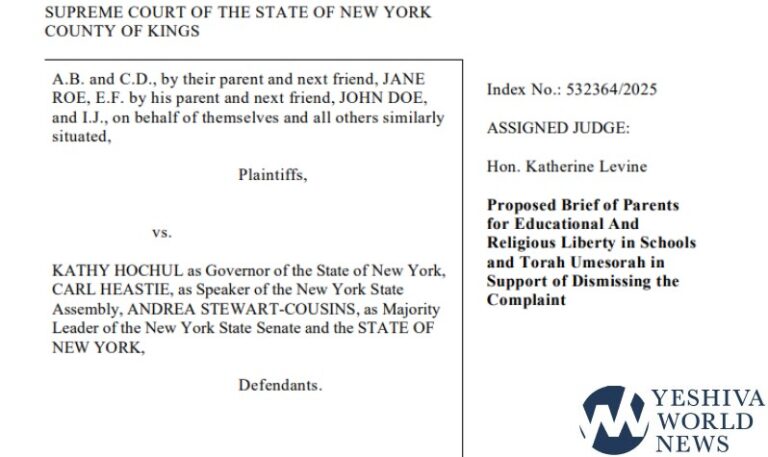The thesis that is the Jewish Nation has an antithesis: Amalek. And just as Klal Yisroel is defined by the Torah, so is its polar opposite associated with a particular system of thought and attitude.
Amalek the nation is unknown to us today; the mitzvah d’Oraysa to destroy it to avert the mortal threat it poses to all that is good and holy is thus currently moot.
Amalek the notion, though, is very much present – in the broader world, the Jewish one and perhaps, to a degree, within each of us as well. And its undermining remains an obligation both urgent and clear.
A hint to the attitude defining Amalek lies in the Torah’s words immediately preceding that nation’s first appearance. In parshas Beshalach (17:7), just before the words “And Amalek came,” the Jews wonder “Is Hashem in our midst or not?” The Hebrew word for “not” – “ayin” – literally means “nothing.” That Amalek’s attack comes on the heels of that word is fitting, because Amalekism stands for precisely that: nothing. Or, better: Nothing – the conviction that all, in the end, is without meaning or consequence.
The Gematria of the word “Amalek,” as the seforim note, equals that of “sofek,” or “doubt.” Not “doubt” in the word’s simplest sense, implying some lack of evidence, but rather doubt as a belief: the philosophical shunning of the very idea of surety – the embrace of cynicism, the championing of meaninglessness.
For there are two diametric ways to approach life, history and the universe. One approach perceives direction and purpose; the other regards all as the products of randomness – cold, indifferent chaos.
The latter approach is the essence of Amalekism. It is a worship of chance, reflected in things like the Purim story’s Amalekite villain Haman’s choice to cast lots – putting his trust in chance – in choosing a date to annihilate the Jews.
The religion that is Amalekism is often regarded as a harmless agnosticism. But it is hardly benign. Because if nature is but a series of dice-rollings, its pinnacle, the human being, is just another pointless payoff. Man’s actions do not make – indeed, cannot make – any difference at all. Yes, he may benefit or harm his fellows or his world, but so what? There is no ultimate import to either accomplishment.
In fact, asserts the chance-worshipper, he is no different from the animals whom he considers, through the lottery of natural selection, his ancestors. He may be more evolved, but in the end is no less an expression than they of purely random events.
Amalek’s credo is proudly and publicly proclaimed today. From “People for the Ethical Treatment of Animals” (PETA), which contends that “meat is murder”; to Princeton University’s Professor Peter Singer, who asserts that “the life of a newborn is of less value than the life of a pig, a dog or a chimpanzee”; to books like “Eternal Treblinka,” which makes the loathsome comparison of animals slaughtered for food with (one winces to even repeat it) the victims of the Nazis.
And it lurks, more subtly but no less surely, in the contemporary insistence that chance-based evolutionary theory is the only explanation for the diversity of species.
One who sees only random forces as the engine of that diversity may be able to offer an explanation of the human belief in right and wrong – claiming, for instance, that such belief evolved through “natural selection” to confer some biological advantage to humans. But he cannot justify the belief itself as having any more import than any other utilitarian evolutionary adaptation.
And so, faced with the Jewish conviction that ultimate meaning exists, and that the human being is the pinnacle not of blind evolution but of purposeful Creation, Amalek mocks. Men, he sneers, are no different than the monkeys they so closely resemble, and the actions of both of no ultimate import.
Interestingly, our resemblance to apes may figure in the pivotal account of Amalek’s attack on the Jews after Yetzias Mitzrayim. When Moshe lifted his hands, the Torah recounts, the tide of the fight turned in favor of the Bnei Yisroel; when he lowered them, the opposite occurred.
“And do the [lifted] arms of Moshe wage war?” asks the Gemara. “Rather,” it explains, “when the Jews lifted their eyes heavenward, they were victorious…” And so the lifting of Moshe’s hands signifies the Jews’ beseeching Hashem.
The etymology of the word Amalek is unclear. But one might consider it a contraction of the word “amal” – “labor” – and the letter “kuf,” whose letters spell the Hebrew word that means, of all things, “monkey.”
It is intriguing and perhaps significant that among all the earth’s creatures, only humans and primates can lift their arms above their heads. And little short of astounding that precisely that movement figures so pivotally in the context of a battle between the nation proclaiming that human life has no special meaning – that men are but smooth-skinned apes – and the nation that proclaims human life has unique meaning.
Because, while primates can also lift their arms, the gesture is an empty one; when humans do the same thing, it can be the most potent expression of relating to the Divine.
When Moshe lifts his arms, indicating the Jews’ turning to Hashem, it can be seen as a declaration that our “amal,” our labor, is not the action of a monkey but the meaningful expression of human beings.
“And his hands were emunah” – says the posuk there, strangely. Or not so strangely. Moshe’s hands declared belief in humanity’s unique relationship to Hashem.
Our ancestors thus prevailed in the battle by negating Amalekism – by demonstrating their conviction that Hashem exists and that we are beholden to Him.
On Purim, Jews the world over commemorate the crucial, if not final, victory over Amalek that took place in the time of Mordechai and Esther, by publicly reading Megillas Esther. As has often been remarked, it is a unique scroll in Kisvei HaKodesh, the only one that makes no overt reference to Hashem. Instead, it forces us to seek Him in the account’s “chance” happenings, to perceive Him in seemingly “random” events.
By doing precisely that, our ancestors merited Hashem’s protection and emerged victorious. May our own rejection of the Amalek-idea in our time merit us the same.
© 2007 AM ECHAD RESOURCES
[Rabbi Shafran is director of public affairs for Agudath Israel of America. The above essay appears in a longer form in the current edition of The Jewish Observer and is offered with its permission.]










